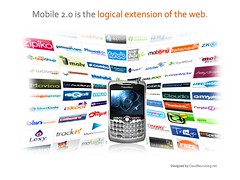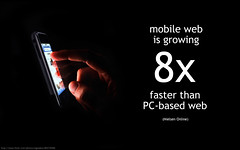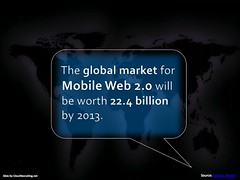 Something that digital marketers are having to address more and more is mobile marketing. And it’s more than just SMS ads. It’s also location-based service, near fields communication, and the mobile web.
Something that digital marketers are having to address more and more is mobile marketing. And it’s more than just SMS ads. It’s also location-based service, near fields communication, and the mobile web.
This is why 2 of Business Week’s 25 Most Influential People on the Web made the cut for their activities in the mobile marketplace. While Steve Jobs ranked #10 for turning “his attention to the wireless world, challenging entrenched players like Motorola and Research In Motion with the iPhone,” Nokia’s VP, Marketing, Anssi Vanjoki ranked #22 for being “responsible for convincing consumers as well as business partners that Nokia’s devices are useful for much more than talking and occasionally snapping a photo,” as well as the front man of a company that’s “directly taking on Apple, Google, and Research in Motion.”
For digital marketers, the lesson is that we have to start thinking about the mobile web (and its users) because it’s well on its way to rivaling the desktop/laptop web. Of course, when a medium is this new, understanding its users and their habitat can be a challenge.
 Fortunately, mobile industry leaders like Ericsson Inc. have people like Pankaj Asundi, VP of Multimedia and Content, sharing their insight and experience with the rest of us. At the 2008 CTIA show, Pankaj presented his view on consumer segmentation models for mobile, and writing for the Canadian Marketing Blog, mobile marketer Phil Barret posted on the 8 Different Mobile Consumer Segments.
Fortunately, mobile industry leaders like Ericsson Inc. have people like Pankaj Asundi, VP of Multimedia and Content, sharing their insight and experience with the rest of us. At the 2008 CTIA show, Pankaj presented his view on consumer segmentation models for mobile, and writing for the Canadian Marketing Blog, mobile marketer Phil Barret posted on the 8 Different Mobile Consumer Segments.
By comparing these different mobile consumer segments against our target demographics, we can understand how to engage our users and customers as they wade into the mobile web. Here is Pankaj’s break down as presented by Phil:
- Careerist – The believe that to say ahead of the game you need the best tools. They are 25-39 years old. Their bills are paid for by company. They have limited free time and mobile is key part of day to day life. Knowledge is power… and time is money!
- Experiencers – They are all about new experiences, possessions, technologies etc… They are early adopters.
- Pioneer Youth – I want it all from my mobile… and now. Second best is not good enough. Always texting. 15-24 years old.
- Mainstream Youth – They want the latest gadget so that they can belong. They aren’t necessarily technical experts. 15-24.
- Mainstream Materialists – Gadgets and mobile are fashion accessories – anything that will make them look good. 25-29 years old. They live for today and not tomorrow. Use more for show than communication.
- Basic phoners – They use their mobile to call only. Many have mobile phones as emergency backups. They likely don’t know how to text message. 40+ years old.
- Family phoners – need good reason to adopt new technology. They are happy with what they’ve got and they mostly use their mobile device to stay in touch with family.
- In touch organizers – my mobile keeps me connected. 30-64 years old. These are parents who juggle busy professional and social lives, organizing their family, friends, and local community. Average tech users – competent but not experts.
 Exactly how the mobile web is going to shape-up, I don’t know. But one thing is for sure; it’s not going to be as straight-forward as the current web. Rather, it’s going to require that we reach out to users not only to where they are, but based on where they are.
Exactly how the mobile web is going to shape-up, I don’t know. But one thing is for sure; it’s not going to be as straight-forward as the current web. Rather, it’s going to require that we reach out to users not only to where they are, but based on where they are.
After all, mobile targeting is precisely the kind of user-specific relevancy that companies like Google have tried to provide through personalized search: it’s based on location, history, and even your surroundings. It’s important, then, that we start considering how these factors are going to change the way we do business — that is, both the opportunities it will present, and the challenges it will pose as some of our most time-tested methods are rendered obsolete.
Excellent Post. I am considering beginning and ending my career in ICT with Mobile App technology. But I hear of the Mobile Web 2.0; it sounds great. I like it. Tell me more. SDK(s) are twisting my head. What kind of companies/ organization will appreciate this developers [if i get there].